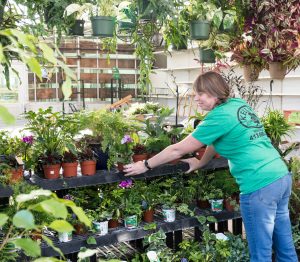by Nick Lombardi, intern WSU ’18
WESTFIELD – Have you ever wanted to grow vegetables? Do you believe that hard work and diligence can pay off in the long run? If yes, then now is the time to start growing a summer garden.
If you like corn, eggplant, lettuce, zucchini, tomatoes, or a dozen other foods or flowers; any of them can be grown at home with a little time and some love.
Adrianne Kunz, Nursery Manager at Kelly’s Home and Garden, provided advice on summer crop success.
Before you start, the most important thing is knowing the difference between hot and cool crops.
Corn and beans are considered hot and should be grown under direct sunlight, while zucchini and lettuce prefer partly shaded areas. Therefore, zucchini is often grown next to corn. These are called sister crops because the tall corn stalks provide shade.
If you live in a place lacking shade, she suggests creating artificial shade for your plants. Be creative. A plastic tarp held up by wooden stakes is just one way to build a shelter for plants that are sensitive to the sun.
One helpful tip that Kunz mentioned was to start with a partially grown plant if you’re trying to grow tomatoes in the summer.
Tomatoes need to be seed planted at the end of spring, after the last frost, and take time before they’re ready to produce fruit. Most gardening stores will sell the starter tomato plants. They are jokingly referred to as “cheater” plants, but nobody should take shame in using them, especially if an unsuspected frost kills your plants.
If you want to get practice growing and harvesting, then grow lettuce.
From seed to a head, it can take around two weeks to grow and produce an edible lettuce product. If you love salads then you’ll be amazed at how much you save on trips to the supermarket.
“Start easy, start small” said Kunz for first-time gardeners.
She advises that you should ask questions of an avid and successful gardener if you’re unsure.
The internet is full of gardening tips, but visiting a local gardener will often yield better advice, since soil and climate will be different in every state, town, and neighborhood.
Kunz believes that “nature is not lenient,” and with hard work anybody can grow a healthy garden.
She says to check for bugs, water your plants daily, and never plant the seeds in dry soil. If the seeds dry out after they start the germination process, they will also die.
Another thing to remember is to check the information tags that come with plants and are on seed bags as well. Doing this can save you wasted time or a failed crop.
A great way to prevent failure is to plant seeds in groups of three. Kunz reflected on this concept with an anecdote about Native American farmers who did this, and believed that the three seeds they planted were for God, the animals, and the people. This goes to show that old traditions are still passed down in this age of technology, and some things never change.
If you feel like investing yourself in a healthy, productive new interest, then growing a garden can be a very rewarding passion to pursue.


